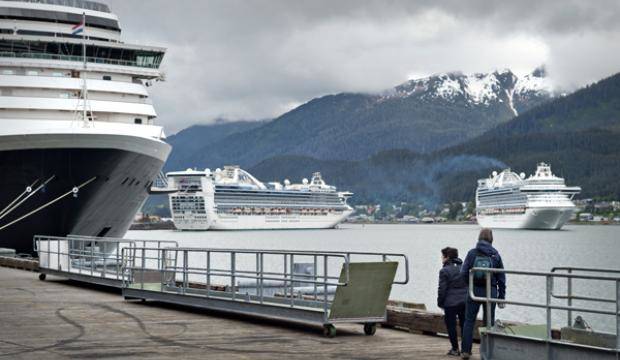A teenager visiting Alaska on a cruise ship last week had the measles, health officials say, prompting concern that passengers may spread the rarely-seen virus further.
A group of passengers who may have contacted the patient disembarked in Seward from the Norwegian Jewel on Monday, Aug. 13.
On Tuesday, the Alaska Department of Health and Social Services warned health care providers to look out for measles symptoms like rashes, runny noses, fevers and red eyes from passengers who may have contracted the disease.
Health officials called the risk of secondary cases low. The patient was at the tail end of infectiousness when she boarded, officials said, and was placed in medical isolation shortly after boarding the ship in Vancouver, British Columbia, Aug. 6.
“The reason why we notify health care providers in a situation like this, even though it’s a low-risk, is measles is so highly contagious,” State Epidemiologist Dr. Joe McLaughlin told the Empire in a Tuesday phone interview. “It spreads through the air through respiratory secretions: coughs, sneezes.”
The ship docked in Ketchikan, Juneau, Skagway and Glacier Bay before the cruise ended in Seward.
Several days prior to the cruise, the patient reported waking up with a rash, fever and cold-like symptoms after a trip to Thailand, according to DHSS.
The patient’s parents, traveling with her, reported that she had never received the measles, mumps, and rubella (MMR) vaccine.
On Aug. 8, the patient, a 16-year-old non-U.S. citizen whose name is being withheld, was transferred to PeaceHealth Ketchikan Medical Center for care.
Doctors diagnosed her with measles Aug. 10, several hours after her discharge from the hospital.
At that point, she was no longer considered contagious.
Though the disease is highly contagious, the risk of passing it on is very low after four days after the onset of a rash, according to DHSS.
Health officials believe the patient boarded the ship the fourth day after rash symptoms began, giving them reason to believe she wasn’t highly contagious while in contact with anyone who may still be in Alaska.
The disease has a 7-21 day incubation period.
The first day a passenger may show symptoms would have been Monday, seven days after encountering the measles patient.
Anyone who contracted the virus is expected to show symptoms before Aug. 27.
Thanks to vaccines, the measles were declared eliminated from the United States in 2000, McLaughlin said. It’s rare now to see a case that doesn’t originate from outside of the country.
The last two recorded cases of measles in Alaska both occurred in middle-aged people, McLaughlin said, who may not have been vaccinated for measles (MMR vaccines weren’t required until 1957). In 2000, a middle-aged Anchorage resident contracted a case.
In 2015, a middle-aged Fairbanks resident was diagnosed after a trip to Mongolia
Alaska’s MMR vaccination rates for measles are below the national average. The CDC recommends routine vaccination with a two-dose series of MMR, the first at 12–15 months old and the second at four-six years old.
According to the latest numbers, from 2016, 86 percent of Alaska children age 19-35 months had received one or more doses of the MMR vaccine.
The national average is 91 percent. Alaska requires two doses of the vaccine for school entry at kindergarten, though there are religious and medical exemptions.
According to the latest numbers, 89 percent of Alaska kindergartners had received two MMR doses in 2016. The national average is 94 percent.
Earlier this year, Alaska suffered an outbreak of mumps, another illness the MMR vaccine has been shown to prevent.
[Mumps confirmed in Juneau for first time in 20 years]
McLaughlin stressed that measles, though considered eliminated in the U.S., can be very dangerous.
Out of 1,000 people who contract the virus, two to three will die from it. A higher rate will experience life-changing complications.
“It’s really important for all Alaskans to understand the tremendous benefit of vaccinating their children and making sure they’re vaccinated. Not only against measles, but all of the vaccine-preventable diseases that we currently have vaccinations for,” he said.
• Contact reporter Kevin Gullufsen at 523-2228 and kgullufsen@juneauempire.com. Follow him on Twitter at @KevinGullufsen.


